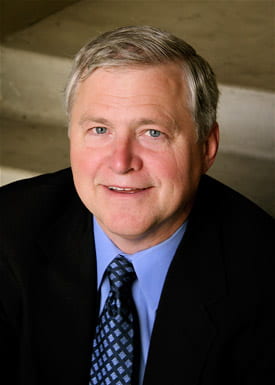 “Just after noon, and its already standing room only,” joked Annenberg School for Communication director Larry Gross. Students, faculty, and staff gathered at the first Annenberg Research Seminar on August 30, 2010. Faculty Fellow Tom Hollihan kicked off the series with his presentation, Barack Obama and the Debate on Health Care Reform: Dialogic Argument vs. the Politics of Resistance.
“Just after noon, and its already standing room only,” joked Annenberg School for Communication director Larry Gross. Students, faculty, and staff gathered at the first Annenberg Research Seminar on August 30, 2010. Faculty Fellow Tom Hollihan kicked off the series with his presentation, Barack Obama and the Debate on Health Care Reform: Dialogic Argument vs. the Politics of Resistance.
Hollihan explained that Obama’s campaign message was that of hope and change, but not just in a changing of the presidential office but “hope that new leadership could reinvigorate government. Change was the most repeated part of the Obama campaign. Not just a change in policy but change within government itself,” said Hollihan.
The biggest change the Obama administration sought was the implementation of a universal health care system available to all American citizens. However, Obama’s policies were met by fierce opposition from the Republican officials in the Senate and House of Representatives.
Hollihan went on to further explain that President Obama tried to keep true to his campaign promises, allowing for change within the government policy, asking for both sides of the aisle to work together and reach a mutual agreement on health care that would benefit the American people. He encouraged town hall meetings and forums in which officials could discuss ideas that would involve a larger audience. “One reason we need argument in the public sphere because it allows for greater discourse and greater understanding,” said Hollihan. “When you are willing to enter into a dialogic argument, you are putting your ideas on the line to be challenged by others.” Obama was searching for alternatives and opened the conversation to the GOP to give input so a compromise could be reached.
The opposition to the President’s proposed health care reform was strong from the political right. Instead of entering into a dialogic argument, which would encourage the process of internalizing on topics of mutual concern, such as the overall health and well-being of all American citizens, Hollihan argues that the GOP chose to enter into strategic arguments, most favored by modern age politics. Strategic arguments are formed to emphasize one’s gains and minimize loses.
“Those that compromise and reach across the aisle are people who are contrary to the principles of strategic argument.” This is one of the reasons Hollihan argued that so few Republicans were willing to support the bill, often being threatened by their own party to lose campaign funding if they chose to support the President. The media circus that followed, with the explosion of the Tea Party and the emergence of former vice presidential candidate becoming a voice of this movement, Hollihan says that “story becomes about the tactic and the debate and not just about the outcomes. …There was a sincere attempt at transparency. Town hall meetings turned into a public space for people to create arguments and spectacles for the media.”
Obama’s dialogic argument was that health care was a “right” and access to its benefits is a “moral issue”. He asked for Congress to come from both sides and work together to find a solution though, Hollihan says the GOP adopted an “all or nothing mentality”, which cannot work in a government which by nature is built on the ideal of compromise.
“In a democracy, civic virtue matters,” closed Hollihan.
Following his seminar, a dialogic argument within the lecture hall began, with faculty and students raising questions of concern that though Obama’s practices of increasing transparency and creating a dialogic conversation were simply not enough in such a polarized state.
“When we start with the principle that health care is a right, is that dialogical position? By saying that this is what it is,” argued CCLP Director Geoffrey Cowan.
“Starting with a statement is not against a dialogic argument,” answered Hollihan. “If you’re not willing to put your arguments at risk, then you are not taking part in a dialogic conversation.”
For more information about President Obama’s campaign and used as one of the references Hollihan brought forth during his seminar, read The Obama Victory by Kenski, Hardy, and Jamieson.
Also, you can watch the video of Hollihan’s presentation on USC Annenberg’s YouTube Channel.